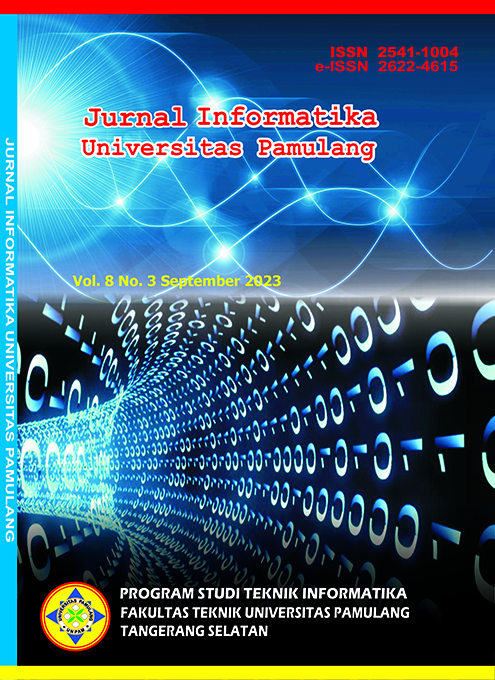Analysis Of User Satisfaction Of The Haji Pintar Application Using The Pieces Method At The Office Of The Ministry Of Religious Affairs Of Palembang City
DOI:
https://doi.org/10.32493/informatika.v8i3.33962Keywords:
Application, Satisfaction, PIECESAbstract
The purpose of this study is to determine the analysis of user satisfac-tion with the Application Haji Pintar using the PIECES method. This research method is a descriptive method with a quantitative research approach. The population in this study is all students of the Palembang City Ministry of Religious Affairs Office who use the application Haji Pintar as many as 771 Haji Pintar Application users in 2022. The sam-pling technique using random sampling obtained a sample of 30 people. The results of the study The PIECES indicator variable has a relation-ship with user satisfaction seen from the value of Fcalculate 3.437 > Ftable 2.51, so it can be concluded that all variables together have a positive effect on user satisfaction. The value of the satisfaction level of users of the Haji Pintar Application using the PIECES method on application users, seen from the R Square value of 47.3%. Which means that users of the Application Haji Pintar at the Office of the Ministry of Religious Affairs of Palembang City are satisfied with user satisfaction on the data at the Office of the Ministry of Religious Af-fairs of Palembang City.
References
Aditya, N. M. B., & Jaya, J. N. U. (2022). Penerapan Metode PIECES Framework Pada Tingkat Kepuasan Sistem Informasi Layanan Aplikasi Myindihome. Jurnal Sistem Komputer Dan Informatika (JSON), 3(3), 325. https://doi.org/10.30865/json.v3i3.3964
Afrina, Utamajaya, J. N., & Surmiati. (2022). Analisis Tingkat Kepuasan Pelanggan Aplikasi Jamride Penajam Paser Utara Menggunakan Metode PIECES. 9(2), 359–366. https://doi.org/10.30865/jurikom.v9i2.4048
Canta, D. S. (2019). Analisis Kepuasan Penggunaan Aplikasi Grab Customer dengan Menggunakan PIECES Framework Pada UKM IT. J-Sim : Jurnal Sistem Informasi, 19–23.
Ghozali. (2018). Aplikasi Analisis Multivariate dengan Program IBM SPSS 25. Badan Penerbit Universitas Diponegoro.
haji.kemenag.go.id. (2022). Aplikasi Haji Pintar, Permudah masyarakat mendaftar Haji.
Ikhtiarti, D., & Sutabri, T. (2023). Analisis IT Service Management (ITSM) Layanan E-Learning Universitas Bina Darma Menggunakan Framework ITIL V3. Jurnal Penelitian Teknik Informatika, 6(April), 48–53.
Jakaria, & Utamajaya, J. N. (2022). Analisis Kepuasan Pengguna Aplikasi Lazada Masyarakat Penajam Menggunakan Metode Pieces Framework. JURIKOM (Jurnal Riset Komputer), 9(2), 464–471. https://doi.org/10.30865/jurikom.v9i2.4091
Klarasati, R., & Sutabri, T. (2023). Analisis Pengukuran Tingkat Kepuasan Dosen Terhadap Sistem Informasi Akademik Menggunakan Metode Usability Pada Universitas Prabumulih. Jurnal Penelitian Teknik Informatika, 6(April), 12–17.
Novitasari, A., & Sutabri, T. (2023). Analisis Kualitas Layanan Website Bkpsdm Kota Palembang Menggunakan Metode Webqual. Indonesian Journal of Multidisciplinary on Social and Technology, 1(2), 88–94.
Nuryanti, Y. (2017). Kajian Penerapan Sistem Informasi Akademik Dengan Menggunakan Metode PIECES Dalam Meningkatkan Kepuasan Civitas Akademika STIE-STMIK Insan Pembangunan. Jurnal Insan Pembangunan Sistem Informasi Dan Komputer (IPSIKOM), 5(2), 1–18.
Safarudin, M. S. (2018). Analisis Kepuasan Pengguna Marketplace Tokopedia Dengan Metode PIECES di Tokopedia Community Batam. Seminar Nasional Ilmu Sosial Dan Teknologi (SNISTEK), 1, 109–114.
Santoso dan Zusrony. (2020). Analisis Persepsi Pengguna Aplikasi Payment Berbasis Fintech Menggunakan Technology Acceptance Model (TAM). Jurnal Teknologi Informasi Dan Komunikasi, 11(1), 49–54. https://doi.org/10.51903/jtikp.v11i1.150
Sugiyono. (2011). Metode Penelitian Kuantitaif Kualitatif dan R & D,. Alfabeta.
Sutabri, T. (2004). Sistem Informasi Akuntansi. CV. Andi Offset.
Sutabri, T. (2005). Analisis Sisten Informasi. CV. Andi Offset.
Sutabri, T. (2012). Konsep Sistem Informasi. CV. Andi Offset.
Sutabri, T. (2014). Pengantar Peknologi Informasi. CV. Andi Offset.
Downloads
Published
Issue
Section
License
Copyright (c) 2023 rachman agung prabowo, Merry Agustina, Tata Sutabri, Iin Saprina

This work is licensed under a Creative Commons Attribution-NonCommercial 4.0 International License.
Authors who publish with this journal agree to the following terms:
- Authors retain copyright and grant the journal right of first publication with the work simultaneously licensed under a Creative Commons Attribution-NonCommercial 4.0 International (CC BY-NC 4.0) that allows others to share the work with an acknowledgement of the work's authorship and initial publication in this journal.
- Authors are able to enter into separate, additional contractual arrangements for the non-exclusive distribution of the journal's published version of the work (e.g., post it to an institutional repository or publish it in a book), with an acknowledgement of its initial publication in this journal.
- Authors are permitted and encouraged to post their work online (e.g., in institutional repositories or on their website) prior to and during the submission process, as it can lead to productive exchanges, as well as earlier and greater citation of published work (See The Effect of Open Access).
Jurnal Informatika Universitas Pamulang have CC-BY-NC or an equivalent license as the optimal license for the publication, distribution, use, and reuse of scholarly work.
In developing strategy and setting priorities, Jurnal Informatika Universitas Pamulang recognize that free access is better than priced access, libre access is better than free access, and libre under CC-BY-NC or the equivalent is better than libre under more restrictive open licenses. We should achieve what we can when we can. We should not delay achieving free in order to achieve libre, and we should not stop with free when we can achieve libre.
Jurnal Informatika Universitas Pamulang is licensed under a Creative Commons Attribution-NonCommercial 4.0 International (CC BY-NC 4.0)
YOU ARE FREE TO:
- Share : copy and redistribute the material in any medium or format
- Adapt : remix, transform, and build upon the material for any purpose, even commercially.
- The licensor cannot revoke these freedoms as long as you follow the license terms





